Back to contents of Teachings of Islam (Talim-ul-Haq)
Contents of Part 15
- Visit to Madinah Munawwara
- Ziyarat of the sacred Qabar (grave)
- The Niyyat
- En route to Madinah Munawwara
- Inside Madina Tayyibah
- The method of reciting Salaam at the Holy Raudah (grave)
-
Qabar of Hazrat Abu Bakr Siddique

-
Qabar of Hazrat Umar

- Other places of Ziyarat
- The Departure
-
Traditions about Masjid Nabawi

Rasulullah ![]() said, “My shafa’at (intercession on the Day of Qiyamah) is Waajib
(on me) for the one who visits my grave.”
said, “My shafa’at (intercession on the Day of Qiyamah) is Waajib
(on me) for the one who visits my grave.”
ZIYAARAT or presenting one's self in the Sacred Court of Rasulullah ![]() at Madinah Munawwara is indeed among the greatest blessings and fortunes.
Whoever is blessed with the opportunity of making Ziyarat of Nabi-e-Kareem
at Madinah Munawwara is indeed among the greatest blessings and fortunes.
Whoever is blessed with the opportunity of making Ziyarat of Nabi-e-Kareem ![]() should have an understanding of the tremendous significance and the wonderful
fortune of this Sacred Visit. A windfall of the greatest Sawaab has come
his way. He must, therefore, acquire the maximum benefit from this golden
opportunity which Allah Ta'aala has bestowed on him.
should have an understanding of the tremendous significance and the wonderful
fortune of this Sacred Visit. A windfall of the greatest Sawaab has come
his way. He must, therefore, acquire the maximum benefit from this golden
opportunity which Allah Ta'aala has bestowed on him.
Many people, due to lack of knowledge, lack of proper understanding of the importance of the Ziyarat or through negligence ruin this great chance of gaining the great and wonderful spiritual benefits and Sawaab attendant to the Ziyarat.
After studying these few pages on Ziyarat one will realise the importance
and procedure of the Ziyarat, thereby acquiring maximum benefit from this
Sacred Visit. May Allah Ta'aala fill our hearts with the true love of Rasulullah ![]() ,
a love which will manifest itself in our practical life in the assertion
and dominance of the Sunnah of Rasulullah
,
a love which will manifest itself in our practical life in the assertion
and dominance of the Sunnah of Rasulullah ![]() .
.
Rasulullah ![]() mentioned, "My Shafa'at (intercession) is Waajib (obligatory) for
the one who visits my grave."
mentioned, "My Shafa'at (intercession) is Waajib (obligatory) for
the one who visits my grave."
"Verily, he who made Haj and refrained from visiting me (i.e.
my Qabr) has rendered me an injustice."
Ziyarat of Rasulullah ![]() 's
Holy Qabr (grave) is the highest of Mustahab acts. Therefore those who
proceed for Haj should consider it incumbent upon themselves to make the
Ziyarat. In order to understand the importance and significance of the
journey to Madinah Munawwara, it is necessary to recite some Ahaadith of
Rasulullah
's
Holy Qabr (grave) is the highest of Mustahab acts. Therefore those who
proceed for Haj should consider it incumbent upon themselves to make the
Ziyarat. In order to understand the importance and significance of the
journey to Madinah Munawwara, it is necessary to recite some Ahaadith of
Rasulullah ![]() .
As long as the significance, sanctity and importance of Madinah Munawwara
are not embedded in the heart, the visitor will not be in position to correctly
discharge the rights of the Sacred Visit to the Holy City.
.
As long as the significance, sanctity and importance of Madinah Munawwara
are not embedded in the heart, the visitor will not be in position to correctly
discharge the rights of the Sacred Visit to the Holy City.
Rasulullah ![]() said:
said:
"The La'nat (curse) of Allah, of the Malaa'ikah and of all creation
descends on person who introduces a Bid'a (innovation) in Madinah or gives
refuge to a Bid'ati (innovator) In Madinah. Neither the Farz or Nafl (acts
of Ibaadat) of such a person is accepted.
I will be the intercessor for the Mu'min who patiently bears
the hardship and hunger (which he may encounter) in Madinah."
"I was commanded to make Hijrat (migrate) to a city which overwhelms all cities Madinah Munawwara drives away evil people like a furnace purifies steel."
"He who deceives the people of Madinah will recede into insignificance like salt dissolved by water."
"Among the lands of Islam, the very last city to be destroyed will be Madinah."
Numerous Ahaadith regarding the sanctity, significance and excellence of Madinah Tayyibah have been narrated. It has been mentioned in the Ahaadith that in the sands of Madinah Tayyibah is a cure for every disease.
Hazrat Shaikh Abdul Haqq Muhaddith Dehlwi mentions, "When I was in Madinah
Tayyibah my feet were swollen. I used the blessed sand as treatment for
my ailment. Within a few days was cured."
In view of the sanctity and significance of Madinah Tayyibah , it is
essential to respect and honour the people of Madinah Tayyibah. Rasulullah ![]() has mentioned regarding the inhabitants of Madinah Tayyibah,
has mentioned regarding the inhabitants of Madinah Tayyibah,
"My Ummah should protect the honour and dignity of my neighbours.
My Ummah must not be deficient in fulfilling their rights. Overlook their
faults as long as they abstain from major sins. He who PROTECTS THEIR HONOUR,
I SHALL BE HIS WITNESS ON THE DAY OF QIYAAMAH."
Those who disrespect the people of Madinah Munawwara or quarrel with
them, should take heed to the following warning of Rasulullah ![]() ,
,
"He who dishonours the people of Madinah will be given to drink
from Teenatul Khabal."
"Teenatul Khabal" is a pond in Jahannam where the blood, evil fluids and impurities of the inmates of the Fire will accumulate.
"He who frightens the people of Madinah Tayyibah is like a person who frightens me. Neither his Farz nor his Nafl is accepted."
From the few statements of Rasulullah ![]() which have been cited above, one will be able to understand the holiness
and greatness of Madinah Munawwara and its inhabitants. One therefore has
to regard the opportunity to visit the Sacred Raudah (Grave) of Rasulullah
which have been cited above, one will be able to understand the holiness
and greatness of Madinah Munawwara and its inhabitants. One therefore has
to regard the opportunity to visit the Sacred Raudah (Grave) of Rasulullah ![]() as a great fortune. One must therefore spend every moment in Madinah Tayyibah
constructively so as to obtain maximum benefit and Sawaab.
as a great fortune. One must therefore spend every moment in Madinah Tayyibah
constructively so as to obtain maximum benefit and Sawaab.
To gain the wonderful rewards of the Ziyarat it is important that one consciously guards the heart, tongue and limbs. Abstain totally from all evil, unnecessary acts and discussions. One should speak only when necessary.
Although it is permissible to render the Ziyarat before or after the Haj, the following course is the best:
- If the Haj is Farz, it is best to make the Ziyarat after completing the Haj.
- If it is a Nafl Haj Ziyarat made before or after the Haj will be of the same merit.
- Those who approach Makkah Mukarramah from the direction of Madinah Munawwara, i.e. they will first pass Madinah Tayyibah, should render the Ziyarat before Haj.
- The visitor must constantly remind himself that he is not on a holiday tour. This is no ordinary visit. He is on a holy journey and is, therefore, bound to observe all rules, respects and etiquettes of the sacred visit. He must at no time indulge in any act or discussion which despoils or detracts from the sacredness and Sawaab of the holy visit.
When about to set out for the journey to Madinah Tayyibah make the Niyyat, (i.e. form an intention of Ziyarat of Raudha-e-Aqdas (the Holiest Grave) as well as Musjide-Nabawi. This form of Niyyat is best.
Along the journey to Madinah Munawwara recite Durood Shareef in abundance. In fact, spend all available time, other than the time engaged in Farz acts, reciting Durood Shareef. In this way endeavour to imbue eagerness and enthusiasm within the heart for the Ziyarat.
On the way to Madinah Munawwara visit all the holy places one may pass.
Perform Salaah in the Musjids which are specifically related to Rasulullah ![]() and the Sahaabah. Drink of the waters of the holy wells along the road
to Madinah Tayyibah.
and the Sahaabah. Drink of the waters of the holy wells along the road
to Madinah Tayyibah.
As one nears Madinah Tayyibah, the recitation of Durood Shareef should
be increased. Endeavour to imbue in the heart love and fervour for the
Ziyarat. If one is unable to induce such feelings physically in the heart,
then at least attempt to create such a mental state. Rasulullah ![]() must be foremost in the mind.
must be foremost in the mind.
When the gaze first falls on the trees and buildings of Madinah Tayyibah, recite Durood Shareef much and make Du'aa, It is best to dismount from the vehicle and walk on foot, if this is possible. It is best to proceed bare-footed and shedding tears.
Upon reaching the boundary of Madinah Munawwara, recite Durood Shareef


If possible, take ghusl before entering the City. If this is not possible,
take ghusl after having entered the City. If for some reason this too is
not possible, perform Wudhu. Ghusl is Afzal (best). Put on clean garments
and if possible, new garments.
This Du'aa should be recited as one enters the City Gates:
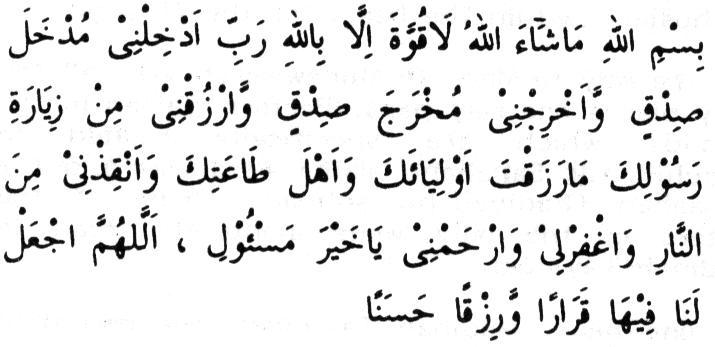
When the gaze falls on the Sacred Green Dome, contemplate its sanctity and nobility. This is the holiest place. After having entered the City, endeavour to enter Masjide Nabawi first. It is best for women to make Ziyarat during the night.
Enter the Musjid with the right foot and with utmost humility and reverence. This Du'aa should be recited when entering:

One may enter the Masjide Nabawi from any entrance one desires. However, it is of greater merit to enter through the entrance known as Baabu Jibra'eel.
Inside the Musjid perform two rak'aat Tahiyatul Musjid in the area known
as Raudah. This is the area between the Mimbar and the Holy Grave of Rasulullah ![]() .
In the first Rak'ah recite Surah Faatihah and Surah Qul Yaa Ayyuhal Kaafiroon.
In the second rak'ah, after Surah Faatihah, recite Surah Qul Huwallahu
Ahad. Speaking on the significance of the area known as the Raudah, Rasulullah
.
In the first Rak'ah recite Surah Faatihah and Surah Qul Yaa Ayyuhal Kaafiroon.
In the second rak'ah, after Surah Faatihah, recite Surah Qul Huwallahu
Ahad. Speaking on the significance of the area known as the Raudah, Rasulullah ![]() said,
said,
"Between my home and my Mimbar is a garden of the Gardens of
Jannah."
Although it is Afzal (best and of greater merit) to perform the two rak'aat Tahiyatul Musjid in the Mihraab of Nabi, one may perform it anywhere in the Raudah, wherever one finds place. After this Salaah, engage in Hamd, Sana and Shukr. Thereafter make Du'aa for the acceptance of the Ziyarat. Then, again perform two rak'aat Salaatush Shukr which is Salaah performed in gratitude to Allah Ta'aala for having blessed one with the great favour of Ziyarat.
If at the time of entry into the Musjid, Jamaa'ah of Farz Salaah has begun or there is fear of one's Salaah becoming Qazaa, then perform the Farz Salaah first. In this case do not engage in Tahiyatul Musjid. One's Tahiyatul Musjid will be incorporated into the Farz Salaah. By joining in the Farz Salaah, Tahiyatul Musjid will be rendered as well.
-
After Tahiyatul Musjid, proceed to the Sacred Qabr of Rasulullah
 with much reverence, humility, eagerness and respect. Banish all affairs
and thoughts of the world from the heart and mind, and brace yourself for
your presence in the Court of the Leader of Mankind, our beloved Rasulullah
with much reverence, humility, eagerness and respect. Banish all affairs
and thoughts of the world from the heart and mind, and brace yourself for
your presence in the Court of the Leader of Mankind, our beloved Rasulullah  .
. - Stand about a metre from the pillar which is located at the corner of the wall at the head-side of the Holy Qabr.
- Stand with the back towards the Qiblah and move slightly to the left so that you directly face the Holiest of Faces.
- Do not cast your gaze all over.
- Do not raise your voice.
- Adopt an attitude of utmost respect and awe.
- It is not respectful to cast the gaze all over.
- Do not do anything disrespectful.
- Do not stand very close to the Holy Qabr.
- Do not touch the wire-mesh enclosure.
- Do not kiss or make Sajdah.
-
While standing there, picture in mind that Rasulullah
 is reclining, facing the Qiblah inside the Holy Qabr and that he is listening
to the Salaams which are being recited.
is reclining, facing the Qiblah inside the Holy Qabr and that he is listening
to the Salaams which are being recited. - Recite the Salaam in a moderate tone, neither too softly nor too loudly.
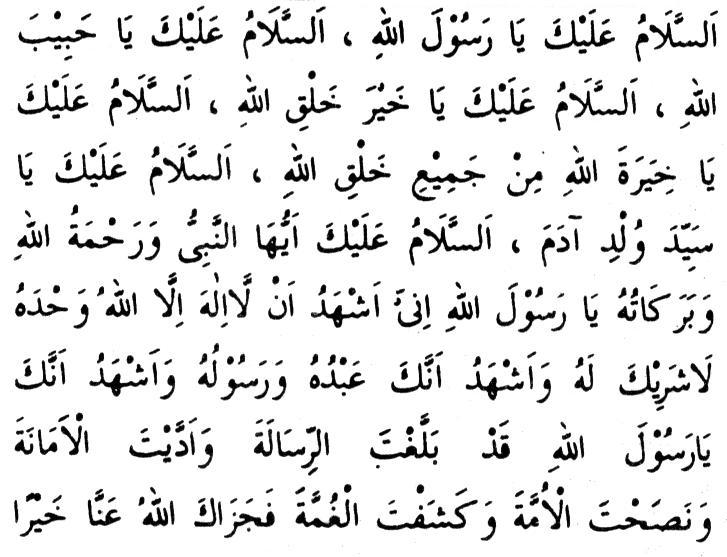
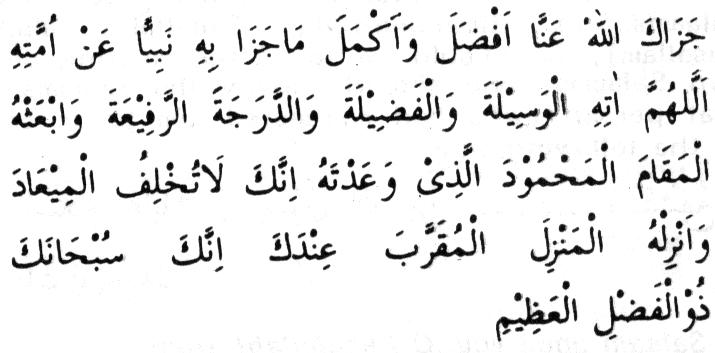
Rasulullah

It is not compulsory to recite the above Salaam formula. One may recite any other form of Salaam one desires. If one cannot remember any long form of Salaam, one may recite whatever one remembers of it. The minimum requirement for Salaam is to say:

If one has been requested to convey someone's Salaams to Rasulullah ![]() ,
he should do so. After reciting ones own Salaams, one should convey the
Salaams of that person (who had requested him to do so), in the following
way:
,
he should do so. After reciting ones own Salaams, one should convey the
Salaams of that person (who had requested him to do so), in the following
way:

While conveying the Salaams of that person, recite his name after the word, (min), which appears in the Arabic Salaam, above.
If several people have requested that their Salaams be conveyed to Rasulullah ![]() ,
one should do so in the following manner:
,
one should do so in the following manner:
On the right side of the Holy Qabar of Rasulullah ![]() is the QABAR of Hazrat ABU BAKR Siddique
is the QABAR of Hazrat ABU BAKR Siddique ![]() .
Move slightly to the right and while standing in line with the holy face
of Hazrat Abu Bakr
.
Move slightly to the right and while standing in line with the holy face
of Hazrat Abu Bakr ![]() ,
recite Salaam on him in the following manner:
,
recite Salaam on him in the following manner:

On the right of Hazrat Abu Bakr ![]() grave is the QABR of Hazrat UMAR
grave is the QABR of Hazrat UMAR ![]() .
Stand facing Hazrat Umar
.
Stand facing Hazrat Umar ![]() and recite Salaam as follows:
and recite Salaam as follows:

One is at liberty to recite lengthier or shorter formulae of Salaams.
According to some Ulamaa, after completing the Salaam on Hazrat Umar ![]() ,
one should move to a position between the two graves of these two Khulafaa
of Rasulullah
,
one should move to a position between the two graves of these two Khulafaa
of Rasulullah ![]() and renew the Salaam as follows:
and renew the Salaam as follows:
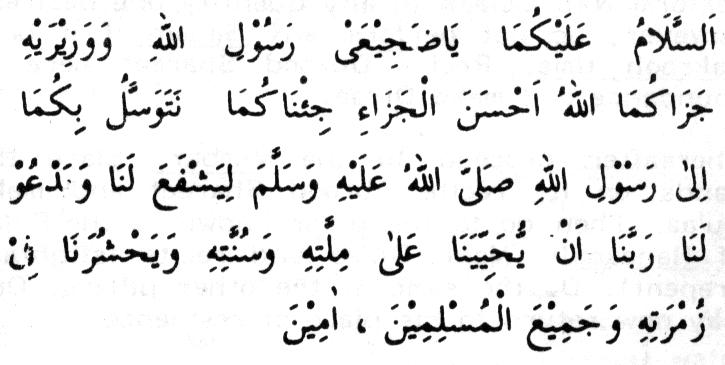
Thereafter, face the Holy Qabr of Rasulullah ![]() and once again renew the recitation of Salaam on Rasulullah
and once again renew the recitation of Salaam on Rasulullah ![]() .
Then recite Hamd and Sana (praises of the Almighty Allah) then Durood Shareef
and make Du'aa to Allah Ta'aala, invoking the Waseelah of Rasulullah. Again
request for Rasulullah
.
Then recite Hamd and Sana (praises of the Almighty Allah) then Durood Shareef
and make Du'aa to Allah Ta'aala, invoking the Waseelah of Rasulullah. Again
request for Rasulullah ![]() Shafa'at.
When making Du'aa, raise both the hands. One's Du'aa should be for one's
self, parents, Mashaa'ikh (spiritual leaders), family, relatives, friends
and for all the Muslims in general. After the Salaam, it is best to say
as follows:
Shafa'at.
When making Du'aa, raise both the hands. One's Du'aa should be for one's
self, parents, Mashaa'ikh (spiritual leaders), family, relatives, friends
and for all the Muslims in general. After the Salaam, it is best to say
as follows:
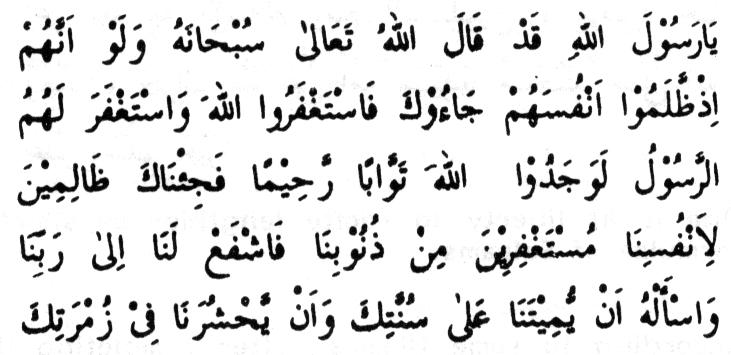
After having made the Ziyarat, go to the pillar known as the Pillar of Abi Lubaabah. Perform two rak'aat Nafl Salaah there and make Du'aa. Then come into the area known as Raudah and perform Nafl Salaah in any quantity one desires. However, do not perform any Salaah if it is Makrooh time. Recite Durood Shareef here in abundance and make Du'aa.
Thereafter, proceed to the Mimbar, place the hands on it, recite Durood Shareef and make Du'aa. Then go to the pillar known as the Pillar of Hanaanah. Make Du'aa and recite Istighfaar (repent). Do the same at the other pillars. One may now return to his place of residence.
One should consider the time available in Madinah Munawwara as a golden opportunity. One should therefore spend most of his time in Musjide Nabawi. When in the Musjid make Niyyah (intention) for I'tikaaf. Nafl I'tikaaf is for any duration. Nafl I'tikaaf for even a minute is valid. Therefore, whenever one is inside the Musjid, Niyyat for Nafl I'tikaaf should be made. Endeavour to complete the Qur'aan Shareef, (make Khatm) in the Musjid.
One should give Sadaqah according to one's means. Honour and respect
the poor, the Caretakers of the Holy Places and, all the inhabitants of
Madinah Tayyibah. Treat them with respect. Deal with them with love and
kindness. Honouring them is honouring and pleasing Rasulullah ![]() ,
even if they are perhaps unjust or unkind, bear it with patience. Do not
quarrel and dispute. When buying and selling with them, make the Niyyah
of aiding them. Such a Niyyah merits Sawaab.
,
even if they are perhaps unjust or unkind, bear it with patience. Do not
quarrel and dispute. When buying and selling with them, make the Niyyah
of aiding them. Such a Niyyah merits Sawaab.
Endeavour to be present at Musjide Nabawi five times daily. One should ensure that one's back is not towards the Holy Grave whether performing Salaah or not. Whenever passing by the Holy Qabr, recite Salaams, even if it be a short Salaam and even if one happens to be outside the Musjid.
It is Mustahab (preferable) to also Qabrastaan (cemetery) known as Jannatul
Baqi' where the graves of the Sahaabah and of members Rasulullah's Family
are. Make a point of visiting the Qabr Sayyidush Shuhadaa (The Leader of
the Martyrs), Hazrat Humzah ![]() .
.
Visit Musjide Quba as well as well as other Musjids.
Visit the holy wells and drink of their water.
After one has completed the Ziyarat and intends to depart, one should
do so from Musjide Nabawi after performing Salaah and making Du'aa. If
possible, perform the departing Salaah of 2 Rak'aat Nafl on or near the
Musalla of Rasulullah ![]() .
If this is not possible, perform it wherever place is available in the
Musjid. After this proceed to the Sacred Raudah (Grave) of Rasulullah
.
If this is not possible, perform it wherever place is available in the
Musjid. After this proceed to the Sacred Raudah (Grave) of Rasulullah ![]() .
Recite Salaam on Rasulullah
.
Recite Salaam on Rasulullah ![]() and thereafter make Du'aa in all earnestness. One's Du'aa should cover
all Deeni as well as worldly needs and desires. One should make Du'aa for
one's self, family, relatives and all Muslims. Make Du'aa for the acceptance
of one's Ibaadat and for steadfastness on Deen. Make Du'aa for a death
on Imaan and for a safe return home.
and thereafter make Du'aa in all earnestness. One's Du'aa should cover
all Deeni as well as worldly needs and desires. One should make Du'aa for
one's self, family, relatives and all Muslims. Make Du'aa for the acceptance
of one's Ibaadat and for steadfastness on Deen. Make Du'aa for a death
on Imaan and for a safe return home.
Among the signs of the acceptance of one's efforts and Ibaadat is the ready flow of tears. If one is unable to shed tears, recite such Du'aas which induce tenderness in the heart and also make an attempt to shed some tears. With a heart stricken with grief and sorrow at the impending separation, take leave. Do not move backwards when leaving because such action is exclusive for the Ka'bah. Depart in sadness giving Sadaqah (charity) to the poor of Madinah Tayyibah liberally. While reciting the Du'aas of Safar (journey), walk away. One should take along some dates and water of the seven wells as Tabarrukaat.
One who can afford it should also visit MADINAH MUNAWWARA before or
after Haj. Gain blessings by visiting the sacred Tomb of Rasulullah ![]() and his Musjid (Musjide Nabawi). Nabi
and his Musjid (Musjide Nabawi). Nabi ![]() has mentioned that one who visits my grave after my demise will gain the
same blessing as if he had seen me during my lifetime. Rasulullah
has mentioned that one who visits my grave after my demise will gain the
same blessing as if he had seen me during my lifetime. Rasulullah ![]() further mentioned that one who merely performed Haj and did not visit my
grave, has done great injustice to me.
further mentioned that one who merely performed Haj and did not visit my
grave, has done great injustice to me.
Sayyidina Rasulullah ![]() is reported to have mentioned:
is reported to have mentioned:
1. "One who offers one Salaah in this Musjid (Musjide Nabawi)
shall receive the reward equivalent to fifty thousand Salaah."
2. "Whoever performs forty Salaah in my Musjid, not missing one
Salaah (in the Musjid), for him is freedom from the fires of Jahannam;
and freedom from punishment and he shall be free from hypocrisy."
3. "One for whom it is possible to die in Madinah (live there
till the end of his life), should die there, for I shall intercede on behalf
of all those who die there."
4. One should undertake a journey only to three Musjids
(with the intention of Ziyarat):
a) Masjide Haraam (Makkah Mukarramah);
b) Musjide Aqsa (Jerusalem) and;
c) to this Musjid of mine (Musjide Nabawi)"
